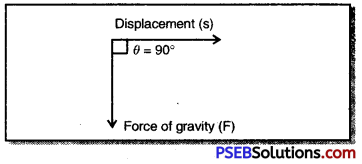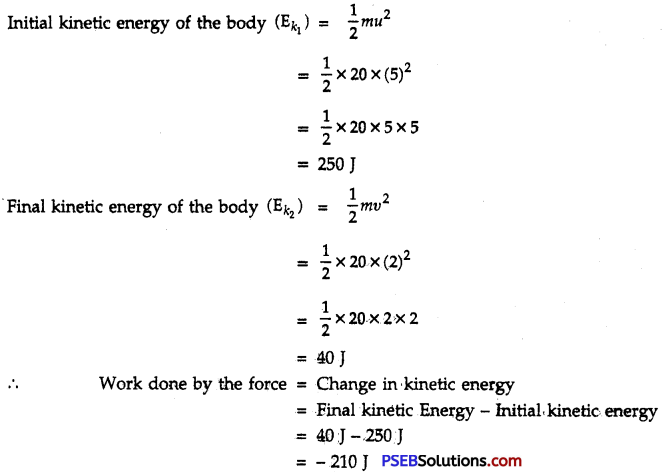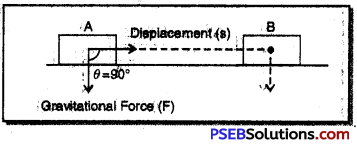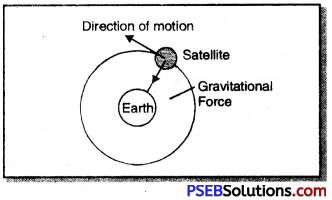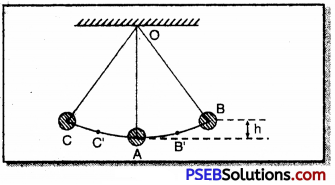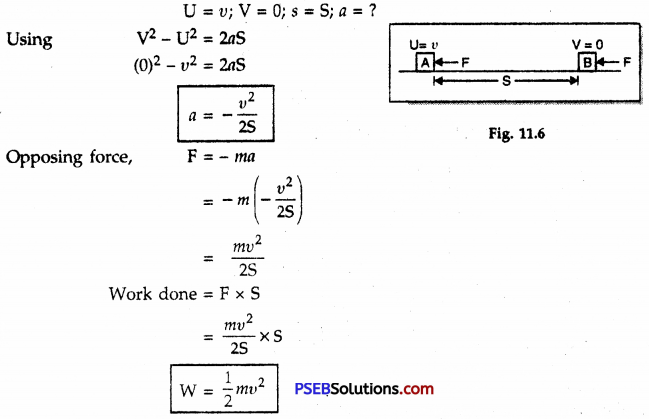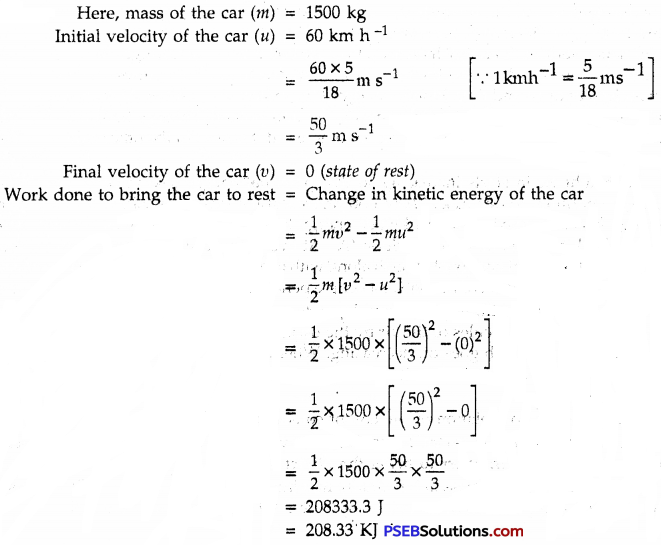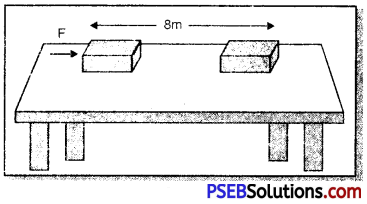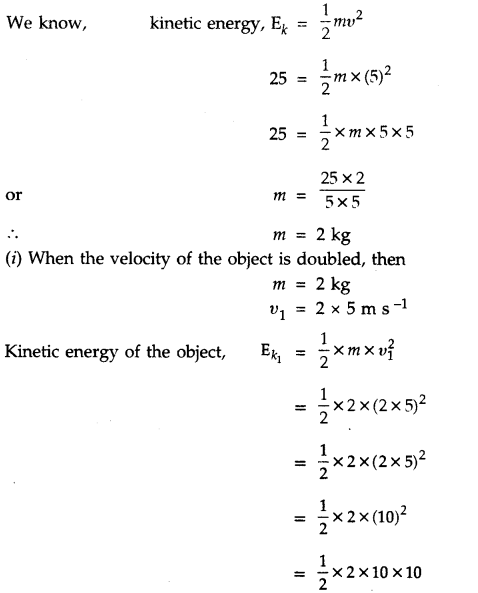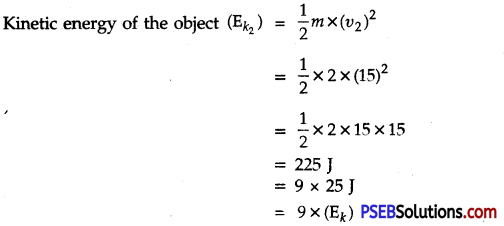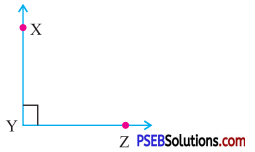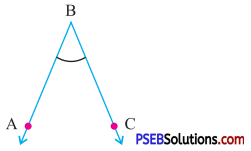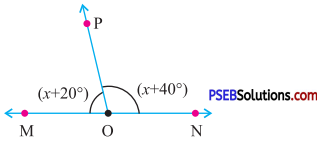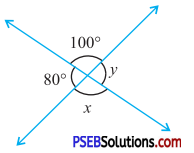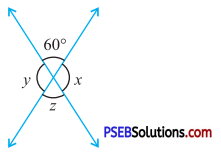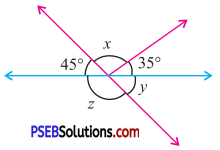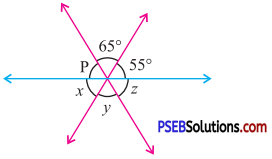Punjab State Board PSEB 10th Class Hindi Book Solutions Hindi Grammar muhavare aur lokoktiyan मुहावरे और लोकोक्तियाँ Exercise Questions and Answers, Notes.
PSEB 10th Class Hindi Grammar मुहावरे और लोकोक्तियाँ
नीचे दिए गए लोकोक्तियों के अर्थ समझकर वाक्य बनाइए
प्रश्न 1.
अपना वही जो आवे काम (मित्र वही जो मुसीबत में काम आए)
उत्तर:
सरदार सिंह की बेटी की शादी में जब उसे कुछ रुपयों की ज़रूरत पड़ी तब रविसिंह ने उसे मुंहमांगी रकम तुरंत दे दी तो सरदार सिंह कह उठा अपना वही जो आवे काम।

प्रश्न 2.
आग लगा कर पानी को दौड़ना (झगड़ा कराने के बाद स्वयं ही सुलह कराने बैठना)
उत्तर:
पहले तो सुलक्षणा मनोरमा से लड़ती रही फिर स्वयं ही उसे मनाने लगी तो मनोरमा ने कहा तुम तो आग लगा कर पानी को दौड़ने का काम कर रही हो।
प्रश्न 3.
उल्टा चोर कोतवाल को डाँटे (अपराध करने वाला उल्टी धौंस जमाए)
उत्तर:
बलकार सिंह ने साइकिल से ठोकर मार कर वृद्ध को गिरा दिया और फिर उसे बुरा-भला कहने लगा, इसी को कहते हैं उल्टा चोर कोतवाल को डाँटे।
प्रश्न 4.
ओस चाटे प्यास नहीं बुझती (अधिक आवश्यकता वाले को थोड़े से संतुष्टि नहीं होती)
उत्तर:
हाथी का पेट एक केले से नहीं भरता उसे तो कई दर्जन केले खाने के लिए देने होंगे क्योंकि उसकी ओस चाटे प्यास नहीं बुझती।
प्रश्न 5.
कोठी वाला रोये छप्पर वाला सोये (धनी प्रायः चिंतित रहते हैं और निर्धन निश्चित रहते हैं।)
उत्तर:
धनराज करोड़ों का मालिक है। उसे अपने धन की सुरक्षा की सदा चिंता बनी रहती है। जबकि फकीरचंद फक्कड़ है, इसलिए सदा खुश रहता है। इसलिए कहते हैं कि कोठी वाला रोये छप्पर वाला सोये।
प्रश्न 6.
बंदर घुड़की, गीदड़ धमकी (झूठा रौब दिखाना/जमाना)
उत्तर:
रंगा कुछ करता-धरता नहीं है बेकार ही सब को बंदर घुड़की, गीदड़ धमकी देकर डराता रहता है।
प्रश्न 7.
बीति ताहि बिसारि दे, आगे की सुध लेय (पुरानी एवं दुःखपूर्ण बातों को भूल कर भविष्य में सावधानी बरतनी चाहिए)
उत्तर:
रामदास को व्यापार में बहुत घाटा हुआ तो सिर पकड़ कर बैठ गया तब सेवा सिंह ने उसे समझाया कि बीति ताहि बिसारि दे, आगे की सुध लेय तब सब ठीक हो जाएगा।
प्रश्न 8.
मन चंगा तो कठौती में गंगा (मन शुद्ध हो तो घर ही तीर्थ समान)
उत्तर:
अशुद्ध मन से तीर्थाटन करने से कोई लाभ नहीं होता, घर पर ही मानसिक शुद्धि हो जाए तो वही तीर्थाटन हो जाता क्योंकि मन चंगा तो कठौती में गंगा होती है।
प्रश्न 9.
सावन हरे न भादौं सूखे (सदा एक जैसी दशा रहना)
उत्तर:
रेशम सिंह गरीबी में पाई-पाई के लिए मरता था, अब उसका व्यापार चमक उठा है तो भी वह पाई उत्तर: पाई के लिए मर रहा है, उसकी तो सावन हरे न भदौं सूखे जैसी हालत है।
प्रश्न 10.
हमारी बिल्ली हमीं से म्याऊँ (सहायता प्रदान करने वाले को ही धमकाना)
उत्तर:
हरभजन की स्कूटर से टक्कर हो गई तो वह गिर पड़ा, सुजान ने उसे हाथ पकड़ कर उठाया तो वह उसी पर बरस पड़ा इसी को कहते हैं हमारी बिल्ली हमी से म्याऊँ।
निम्नलिखित में से किन्हीं तीन मुहावरों/लोकोक्तियों के वाक्य इस तरह बनाएं ताकि उनके अर्थ स्पष्ट हो जाएं
1. (क) इस कान सुनना उस कान उड़ा देना
(ख) कच्चा चिट्ठा खोलना
(ग) तिनके का सहारा।
(घ) अपना कोढ़ बढ़ता जाय, औरों को दवा बताय
(ङ) जोते हल तो होंवे फल।
उत्तर:
(क) इस कान सुनना उस कान उड़ा देना-अनीश को कुछ भी समझाना बेकार है क्योंकि वह तो इस कान सुनकर उस कान से उड़ा देने वाला व्यक्ति है।
(ख) कच्चा चिट्ठा खोलना-सांध्य समाचार-पत्र ने सरकारी भ्रष्टाचार का कच्चा चिट्ठा खोल दिया।
(ग) तिनके का सहारा-मुसीबत में फंसे व्यक्ति के लिए तिनके का सहारा भी बहुत होता है।
(घ) अपना कोढ़ बढ़ता जाय, औरों को दवा बताय-रमन कौर सब को खूब मेहनत से पढ़ने के लिए कहती रहती है पर स्वयं पढ़ाई न करने से फेल हो गई; इसी को कहते हैं अपना कोढ़ बढ़ता जाय, औरों को दवा बताय।
(ङ) जोते हल तो होवे फल-सारा वर्ष कठिन परिश्रम से पढ़ाई करने वाला विद्यार्थी परीक्षा में अच्छे अंक प्राप्त कर सफल होते हैं क्योंकि कहा भी गया है कि जोते हल तो होवें फल।

2. (क) गले का हार
(ख) भगवान् को प्यारा हो जाना
(ग) छक्के छुड़ाना
(घ) अधूरा छोड़े सो पड़ा रहे
(ङ) जाके पैर न फटे बिवाई, सो क्या जाने पीर पराई।।
उत्तर:
(क) गले का हार–सुमित अपने माता-पिता के गले का हार है।
(ख) भगवान् को प्यारा हो जाना-कल सुबह छः बजे आरती की दादी माँ भगवान को प्यारी हो गई।
(ग) छक्के छुड़ाना-भारतीय सेना ने शत्रु सेना के छक्के छुड़ा दिए।
(घ) अधूरा छोड़े सो पड़ा रहे-पप्पू ने पहले आटर्स में दाखिला लिया, फिर कामर्स में चला गया और फिर पढ़ाई छोड़ दी, उसकी तो अधूरा छोड़ सो पड़ा रहे की हालत हो गई।
(ङ) जाके पैर न फटे बिवाई, सो क्या जाने पीर पराई–लाला रामनाथ चाँदी के बर्तन में खाना खाते हैं, वे क्या जाने कि इस महंगाई में ग़रीब कैसे अपनी रोटी का जुगाड़ करता है क्योंकि जाके पैर न फटे बिवाई, सो क्या जाने पीर पराई।
3. (क) पीठ दिखाना
(ख) सफेद झूठ
(ग) आँखें चुराना
(घ) कथनी नहीं, करनी चाहिए
(ङ) नीम हकीम खतरा जान।
उत्तर:
(क) पीठ दिखाना- भारतीय सेना का आक्रामक रूप देखकर शत्रु सेना पीठ दिखा गई।
(ख) सफेद झूठ-मनजीत कौर से बचकर रहना क्योंकि वह हमेशा सफेद झूठ बोलती है।
(ग) आँखें चुराना-सुरेश ने कृष्ण से सौ रुपये उधार लिए थे। अब उसे देखते ही उस से आँखे चुराने लगता है।
(घ) कथनी नहीं, करनी चाहिए-आजकल के नेताओं की कथनी और करनी में बहुत अंतर है क्योंकि जनता को उनकी कथनी नहीं करनी चाहिए।
(ङ) नीम हकीम खतरा जान-जब तुम्हें बिरयानी बनानी नहीं आती तो इतना ताम-झाम क्यों कर रही हो, पता है कि नीम हकीम खतरा जान होता है।
बोर्ड परीक्षा में पूछे गए प्रश्न
प्रश्न 1.
किन्हीं तीन मुहावरों / लोकोक्तियों को वाक्यों में इस प्रकार प्रयोग करें कि उनका अर्थ स्पष्ट हो जाए: लोहा लेना, मोती पिरोना, जोते हल तो होवे फल, घर का भेदी लंका ढाए, जो गरजते हैं वो बरसते नहीं।
उत्तर:
(क) लोहा लेना-डटकर मुकाबला करना।
वाक्य-भारतीय सेना ने शत्रु सेना से लोहा लेकर उसे पराजित कर दिया।
(ख) मोती पिरोना-सुंदर लिखना।
वाक्य-अनन्या की लिखाई ऐसी लगती है जैसे उसने एक-एक अक्षर से मोती पिरो दिए हों।
(ग) जोते हल तो होवे फल-मेहनती व्यक्ति सफल होते हैं।
वाक्य-सारा वर्ष कठिन परिश्रम से पढ़ाई करने वाले विद्यार्थी परीक्षा में अच्छे अंक प्राप्त कर सफल होते हैं क्योंकि कहा भी गया है कि जोते हल, तो होवे फल।
(घ) घर का भेदी लंका ढाए-आपसी फूट से नुकसान।
वाक्य-देश में आतंकवाद कुछ देश द्रोहियों के कारण ही फैल रहा है क्योंकि घर का भेदी लंका ढाहे।
(ङ) जो गरजते हैं वो बरसते नहीं बढ़ाई करने वाले कुछ नहीं कर पाते।
वाक्य-चुनाव के दिनों में बड़े-बड़े वायदे करने वाले नेता चुनाव के बाद अपने सब वायदे भूल जाते हैं क्योंकि जो गरजते हैं वो बरसते नहीं।
प्रश्न 2.
किन्हीं तीन मुहावरों/लोकोक्तियों को वाक्यों में इस प्रकार प्रयोग करें कि उनका अर्थ स्पष्ट हो जाए-
अंग-अंग ढीला होना, आँखें चुराना, काला अक्षर भैंस बराबर, एक पंथ दो काज, एक तन्दुरुस्ती हजार नियामत।
उत्तर:
(क) अंग-अंग ढीला होना-थक जाना।।
वाक्य-दिनभर परिश्रम के बाद मेरा अंग-अंग ढीला हो गया है।
(ख) आँखें चुराना-नज़र बचाना।
वाक्य-सुरेश ने कृष्ण से सौ रुपए उधार लिए थे। अब उसे देखते ही उससे आँखें चुराने लगता है।
(ग) काला अक्षर भैंस बराबर-निरक्षर।।
वाक्य-इंद्रजीत कौर के बनाव-श्रृंगार पर मत जाओ, जब वह बोलेगी तो तुम्हें पता चल जाएगा कि वह तो काला अक्षर भैंस बराबर है।
(घ) एक पंथ दो काज-एक उद्यम से दो कार्य होना।
वाक्य-प्रकाश कौर अस्पताल अपना चैकअप कराने गई थी और लौटते हुए फल-सब्जी भी ले आई। इस प्रकार एक पंथ दो काज हो गए।
(ङ) एक तन्दरुस्ती हजार नियामत-सेहत सबसे बड़ी नियामत।
वाक्य-सारा दिन पढ़ते रहने से कुछ नहीं होता, खाने-पीने का भी ध्यान रखना चाहिए क्योंकि एक तन्दरुस्ती हजार नियामत होती है।

प्रश्न 3.
किन्हीं तीन मुहावरों/लोकोक्तियों को वाक्यों में इस प्रकार प्रयोग करें कि उनका अर्थ स्पष्ट हो जाए
जी भर आना, पेट में चूहे दौड़ना, तेते पाँव पसारिए जेती लम्बी सौर, नेकी कर दरिया में डाल, तू डाल-डाल मैं पातपात।
उत्तर:
(क) जी भर आना-मन का परेशान होना।
वाक्य-पेशावर में स्कूल के बच्चों की हत्या की घटना देखकर मेरा जी भर आया।
(ख) पेट में चूहे दौड़ना-भूख लगना।
वाक्य-खूब खेलने के बाद बच्चों के पेट में चूहे दौड़ने लगते हैं।
(ग) तेते पाँव पसारिए जेती लम्बी सौर-आमदनी के अनुसार खर्च करना।
वाक्य-मनुष्य को कभी भी ऋण लेकर आराम की वस्तुएँ नहीं खरीदनी चाहिए क्योंकि इससे ऋणग्रस्त जीवन भार स्वरूप हो जाता है। इसलिए गुणी कहते हैं कि तेते पाँव पसारिए जेती लंबी सौर।
(घ) नेकी कर दरिया में डाल-उपकार करके जताना नहीं चाहिए।
वाक्य-प्रकाश सिंह ने दर्शन सिंह को नौकरी दिलवाई थी पर इस बात का किसी को पता नहीं चला कि दर्शन सिंह को नौकरी मिली कैसे क्योंकि प्रकाश सिंह नेकी कर दरिया में डाल कहावत पर विश्वास करता था, किसी को कुछ बताता नहीं था।
(ङ) तू डाल-डाल मैं पात-पात-विरोधी के दाँव समझना।
वाक्य-चुनाव के दिनों में दल ‘क’ की चालों का दल ‘ख’ ने होशियारी से जवाब दिया और कहा कि तू डालडाल मैं पात-पात।
(क) मुहावरे-मुहावरा एक ऐसा वाक्यांश है जो सामान्य अर्थ का बोध न कराकर विशेष अर्थ का बोध कराता है। वाक्य में इसका प्रयोग क्रिया के समान होता है, जैसे-‘आकाश-पाताल एक करना’। इस वाक्यांश का सामान्य अर्थ है ‘पृथ्वी और आकाश को मिलाना’ लेकिन ऐसा संभव नहीं है। अतः इसका लक्षण शब्द-शक्ति से विशेष अर्थ होगा। ‘बहुत परिश्रम करना’। इसी प्रकार ‘अंगारे बरसना’ का अर्थ होगा ‘बहुत तेज़ धूप पड़ना।’
‘मुहावरा’ शब्द अरबी भाषा का है और इसका अर्थ है-‘रुढ़ वाक्यांश’। मुहावरे शाब्दिक अर्थ को व्यक्त नहीं करते बल्कि रूढ़ अर्थ को प्रकट कराने का कार्य करते हैं।
(ख) लोकोक्तियां-लोकोक्ति को ‘कहावत’ भी कहा जाता है। भाषा को प्रभावशाली बनाने के लिए मुहावरों के समान लोकोक्तियों का प्रयोग किया जाता है। “लोक में प्रचलित उक्ति को लोकोक्ति कहते हैं। यह एक ऐसा वाक्य होता है जिसे कथन पुष्टि के लिए प्रमाणस्वरूप प्रस्तुत किया जाता है।” लोकोक्ति के पीछे मानव समाज का अनुभव अथवा घटना विशेष रहती है। मुहावरे के समान इसका भी विशेष अर्थ ग्रहण किया जाता है, जैसे “हाथ कंगन को आरसी क्या” इसका अर्थ होगा “प्रत्यक्ष को प्रमाण की आवश्यकता नहीं होती।” यहां लोक-जीवन का अनुभव प्रकट हो रहा है-यदि हाथ में कंगन पहना तो उसे देखने के लिए शीशे की आवश्यकता नहीं होती।
मुहावरे और लोकोक्ति में अंतर
| मुहावरा |
लोकोक्ति |
| 1. मुहावरा वाक्य में एक वाक्यांश की तरह प्रयुक्त होता है। |
1. लोकोक्ति अपने आप में एक स्वतंत्र वाक्य होती है। |
| 2. मुहावरा स्वतंत्र रूप से अपने अर्थ को ठीक प्रकार से अभिव्यक्त नहीं कर सकता। |
2. लोकोक्ति स्वतंत्र रूप से अपना अर्थ प्रयुक्त कर सकती है। |
| 3. मुहावरे का लाक्षणिक अर्थ होता है। |
3. लोकोक्ति में शाब्दिक और लाक्षणिक दोनों अर्थ होते है। |
| 4. मुहावरे का प्रयोग भाषा को सौंदर्य तथा किया जाता है। |
4. लोकोक्ति से किसी विशेष घटना अथवा प्रसंग को प्रकट साहित्यिकता देने के लिए किया जाता है। |
| 5. मुहावरों में लिंग, वचन, आदि के अनुसार परिवर्तन होता है। |
5. लोकोक्ति में ऐसा परिवर्तन नहीं होता है। |
| 6. मुहावरे लिंग, वचन आदि में परिवर्तन कर सकते है। |
6. लोकोक्ति लिंग और वचन को प्रभावित नहीं करती है। |
| 7. मुहावरे भाषा को सजीवता और चमत्कार प्रदान करते हैं। |
7. लोकोक्ति वक्ता/लेखक की बात का समर्थन करती है। |
| 8. मुहावरों में प्रायः ‘न’ का प्रयोग होता है जैसे- अंगूठा दिखाना, दाल न गलना आदि। |
8. लोकोक्ति के अंत में प्रायः ‘न’ का प्रयोग नहीं होता। |
| 9. मुहावरों में प्रायः क्रिया, दशा आदि व्यक्त होती है। |
9. लोकोक्ति में कोई न कोई अनुभव या सच्चाई छिपी होती है। |
(क) मुहावरों के अर्थ सहित वाक्य प्रयोग
1. अंगारों पर पैर रखना (जानबूझ कर मुसीबत मोल लेना)-दुबले-पतले रमेश ने भीम पहलवान को कुश्ती लड़ने की चुनौती देकर अंगारों पर पैर रख दिया है।
2. अंगूठा दिखाना (मना करना)-जब मैंने अपने मित्र से सहायता मांगी तो उसने अंगूठा दिखा दिया।
3. अकल का अंधा होना (बेवकूफ होना)-उसे समझाने की कोशिश करना व्यर्थ है। वह तो पूरा अकल का अंधा
4. अक्ल पर पत्थर पड़ना (सोच-विचार न करना)-प्रेम सिंह की अक्ल पर पत्थर पड़ गए हैं, जो वह सारा दिन शराब पीता रहता है।
5. अंग-अंग ढीला होना (थक जाना)-दिनभर परिश्रम करने में मेरा अंग-अंग ढीला हो गया है। 6. अंधे की लकड़ी (एकमात्र सहारा)-मोहन अपने बूढे माता-पिता के लिए अंधे की लकड़ी है।
7. अंधे को दीपक दिखाना (नासमझ को उपदेश देना)-भगवान् कृष्ण दुर्योधन के धृष्टतापूर्ण व्यवहार से समझ गए थे कि उसे उपदेश देना अंधे को दीपक दिखाना है।
8. अपना उल्लू सीधा करना (अपना मतलब निकालना)-स्वार्थी मित्रों से बचकर रहना चाहिए। उन्हें तो अपना उल्लू सीधा करना आता है।
9. अकल मारी जाना (घबरा जाना)-प्रश्न-पत्र देखते ही शांति की अकल मारी गई।
10. अकल चरने जाना (सोच-समझकर काम न करना)-बना बनाया मकान तुड़वा रहे हो, इसे बनवाते समय क्या तुम्हारी अकल चरने गई थी।
11. अपनी खिचड़ी अलग पकाना (सबसे अलग रहना)-अपनी खिचड़ी अलग पकाने से कोई लाभ नहीं होता इसलिए सब से मिल-जुलकर रहना चाहिए।
12. अपने मुँह मियाँ मिट्ट बनना (अपनी तरीफ़ खुद करना)-वीर अपने मुँह मियाँ मिट्ट नहीं बनते वे तो वीरता दिखाते हैं।
13. आँख उठाना (नुकसान पहुँचाना)-यदि तुमने मेरी ओर आँख उठा कर देखा तो मुझ से बुरा कोई न होगा।
14. आँखें चार होना (आमने-सामने होना)-पुलिस से आँखें चार होते ही चोर घबरा गया।
15. आँखें चुराना (नज़र बचाना)-सुरेश ने कृष्ण से सौ रुपए उधार लिए थे। अब उसे देखते ही उस से आँखें चुराने लगता है।
16. आँखें दिखाना (क्रोध करना)-कक्षा में शोर सुनकर जैसे ही अध्यापक ने आँखें दिखाई कि सब चुप हो गए।
17. आँखें फेरना (प्रतिकूल होना)-मतलबी लोग अपना काम होते ही आँखें फेर लेते हैं।
18. आँखें खुलना (अकल आना)-कुणाल को समझाने से कोई लाभ नहीं है जब उसे ठोकर लगेगी तो उसकी आँखें खुल जाएंगी।
19. आँखों का तारा (बहुत प्यारा)-राम दशरथ की आँखों के तारे थे।

20. आँखों में खटकना (बुरा लगना)-अनुशासनहीन बच्चे सब की आँखों में खटकते हैं।
21. आँच न आने देना (नुकसान न होने देना)-माँ अपनी संतान पर आँच नहीं आने देती।
22. आँखों में धूल झोंकना (धोखा देना)-पुलिस की आँखों में धूल झोंकना आसान नहीं है।
23. आग में घी डालना (गुस्सा बढ़ाना)-रमनदीप के स्कूल न जाने से पिता जी क्रोधित थे और उसके झूठ बोलने ने तो उनके क्रोध को और बढ़ा कर आग में घी डालने का काम कर दिया।
24. आस्तीन का साँप (कपटी मित्र)-विश्वासघात करने वाला मित्र मित्र न हो कर आस्तीन का साँप होता है।
25. आसमान पर चढ़ना (बहुत अभिमान करना)-कक्षा का प्रतिनिधि बनते ही महेंद्रसिंह का दिमाग आसमान पर चढ़ गया है।
26. इस कान सुनना उस कान उड़ा देना (किसी बात पर ध्यान न देना)-अनीश को कुछ भी समझाना बेकार है क्योंकि वह तो इस कान सुन कर उस कान से उड़ा देने वाला व्यक्ति है।
27. ईंट का जवाब पत्थर से देना (मुँह तोड़ जवाब देना)-शत्रु पक्ष की धमकियों का जब ईंट का जवाब पत्थर से दिया गया तो उनकी बोलती बंद हो गई।
28. उड़ती चिड़िया पहचानना (अनुभवी होना)-हमारे अध्यापक जी के सामने हमारा कोई भी बहाना नहीं चलता क्योंकि वे तो उड़ती चिड़िया पहचान लेते हैं।
29. ऊपर की आमदनी (रिश्वत, भ्रष्ट कमाई)-ईमानदार व्यक्ति हक की कमाई खाता है, ऊपर की आमदनी पर विश्वास नहीं करता।
30. एक-एक रग जानना (अच्छी तरह से परिचित होना)-मेरे से तुम कोई बहाना बना कर नहीं बच सकते क्योंकि मैं तो तुम्हारी एक-एक रग जानता हूँ।
31. कान खा लेना (किसी बात को बार-बार कहना)-सुचित्रा ने सुबह से पिकनिक पर जाने की रट लगाकर अपनी माता के कान खा लिए।
32. कान पर जूं न रेंगना (कोई असर नहीं होना)—रजनी को चाहे कितना भी समझाते हो उसके कान पर जॅ नहीं रेंगती है।
33. कान में पड़ना (सुनाई देना)-चिल्ला क्यों रहे हो, तुम्हारी बातें मेरे कान में पड़ रही हैं।
34. कानों को हाथ लगाना (तौबा करना)-कानों को हाथ लगाकर कहती हूँ कि अब कभी झूठ नहीं बोलूँगी।
35. कच्चा चिट्ठा खोलना (गुप्त वार्ता प्रकट करना)-सांध्य समाचार-पत्र ने सरकारी भ्रष्टाचार का कच्चा चिट्ठा खोल दिया।
36. कफ़न सिर पर बांधना (मरने के लिए तैयार रहना)-भारतीय सैनिक कफ़न सिर पर बांध कर युद्धभूमि में जाते
37. कलेजे का टुकड़ा (बहुत प्रिय)-अपनी संतान माँ-बाप के कलेजे का टुकड़ा होती है।
38. खाने के लाले पड़ना (बहुत गरीब होना)-कोई काम न मिलने से राम लाल के घर खाने के लाले पड़ गए हैं।
39. खून पसीना एक करना (बहुत मेहनत करना)-किसान अपना खून पसीना एक कर के अन्न उगाता है।
40. गड़े मुर्दे उखाड़ना (बीती हुई बातों को कहना)-रवि वर्तमान की बात नहीं करता, हमेशा गड़े मुर्दे उखाड़ता रहताहै।
41. गागर में सागर भरना (बड़ी बात थोड़े से शब्दों से कहना)-बिहारी ने अपने दोहों में गागर में सागर भर दिया है।
42. गुद्ड़ी का लाल (सामान्य परंतु गुणी)-सतीश एक गरीब रिक्शे वाले का पुत्र थे लेकिन उसने भारतीय प्रशासनिक सेवा में प्रथम स्थान प्राप्त कर सिद्ध कर दिया है कि वह तो गुदड़ी का लाल है।
43. घर सिर पर उठाना (बहुत शोर करना)-घर में मम्मी के न होने पर बच्चों ने शोर करके मानो घर सिर पर उठा लिया था।
44. घाव पर नमक छिड़कना (दु:खी को और दुःखी करना)-महंगाई के इस युग में निर्धन कर्मचारियों के भत्ते बंद करना घाव पर नमक छिड़कना है।
45. घी के दिये जलाना (बहुत प्रसन्न होना)-अपने सैनिकों की विजय का समाचार सुनकर भारतवासियों ने घी के दिये जलाए।
46. चादर के बाहर पैर पसारना (आय से अधिक खर्च करना)-चादर के बाहर पैर पसारने वाले लोग सदा दुःखी रहते हैं।
47. चूड़ियाँ पहनना (कायर)-जो सैनिक युद्ध में जाने से डरते हैं, उन्हें घर में चूड़ियाँ पहन कर बैठना चाहिए।
48. चोली दामन का साथ (सदा साथ रहना)-राम शाम चाहे कितना झगड़ा कर लें फिर भी उनमें चोली दामन का साथ है क्योंकि वे एक-दूसरे के बिना रह नहीं सकते।
49. चिकना घड़ा (निर्लज्ज व्यक्ति, बेअसर वाला)-राम सिंह तो चिकना घड़ा है, उस पर तुम्हारे उपदेशों का कोई असर नहीं होगा, वह अपनी बुरी आदतें नहीं छोड़ने वाला।
50. चिकनी चुपड़ी बातें करना (चापलूसी करना)-नम्रता की चिकनी चुपड़ी बातों में आकर उसे उधार मत दे बैठना, वह लौटाने वाली नहीं है।
51. छोटा मुँह बड़ी बात (अपनी हैसियत से बढ़कर बात करना)-चींटी ने कहा मैं हाथी को मार दूंगी और उसका ऐसा कहना तो छोटा मुँह बड़ी बात है।
52. छक्के छुड़ाना (पराजित करना)-भारतीय सेना ने शत्रु सेना के छक्के छुड़ा दिए।
53. ज़हर उगलना (ईर्ष्या की बातें करना)-कैकेयी के कानों में मंथरा हरपल ज़हर उगलती रहती थी।
54. जी भर आना (मन का परेशान होना)-पेशावर में स्कूल के बच्चों की हत्या की घटना देखकर मेरा जी भर आया।
55. टस से मस न होना (परवाह न करना)-राघव को कितना समझाओ कि बुरे लोगों का साथ छोड़ दे पर वह टस से मस नहीं होता और उन्हीं लोगों के साथ रहता है।
56. टेढ़ी खीर (कठिन कार्य)-क्रिकेट का विश्व कप जीतना टेढ़ी खीर है।
57. ठोक बजा कर देखना (अच्छी तरह से जाँचना-परखना)–कोई भी सौदा खरीदने से पहले उसे ठोक बजा कर देखना अच्छा होता है।
58. डींग हाँकना/मारना (बढ़ चढ़ कर बातें करना)-शुभम की बातों में मत आ जाना क्योंकि वह सदा डींगें हाँकता रहता है।
59. ढेर करना (मार देना)-राम ने एक ही बाण से मारीच को ढेर कर दिया।
60. तलवार की धार पर चलना (बहुत कठिन काम करना)-आई० ए० एस० की परीक्षा में सफल होना आसान नहीं है, यह तो तलवार की धार पर चलने के समान है।
61. तिनके का सहारा (थोड़ा-सा सहारा)- मुसीबत में फंसे व्यक्ति के लिए तिनके का सहारा भी बहुत होता है।
62. थककर चूर होना (बहुत थक जाना)-माता वैष्णव देवी के मंदिर की चढ़ाई करते हुए सभी यात्री थक कर चूर हो गए।
63. दिन फिरना (भाग्य बदलना)-पंजाब स्टेट लाटरी का प्रथम पुरस्कार मिलते ही फकीर के दिन फिर गए।
64. दिल्ली दूर होना (उद्देश्य प्राप्ति में देरी होना)-नेहा ने अभी दसवीं पास की नहीं पर डॉक्टर बनने के सपने देख रही है जबकि उसके लिए अभी दिल्ली दूर है।
65. दौड़-धूप करना (बहुत कोशिश करना)-नौकरी पाने के लिए हरप्रीत बहुत दौड़-धूप कर रहा है। 66. दूध का धुला (निर्दोष)-आज के नेताओं में कोई एक ही दूध का धुला होता है।
67. धीरज बँधाना (सांत्वना देना)-सुक्खा सिंह के पिता के अचानक स्वर्गवास होने पर उसके मित्र उसका धीरज बंधा रहे थे।
68. नाक रख लेना (मर्यादा बचाना)-कुश्ती में मुक्तसर के पहलवान को हरा कर रक्खे पहलवान ने फिरोज़पुर की नाक रख ली।
69. निन्यानवे के फेर में पड़ना (असमंजस में होना)-निन्यानवे के फेर में पड़ कर मनुष्य अपना जीवन नष्ट कर देता है।
70. पेट में चूहे कूदना (दौड़ना, भूख लगना)-खूब खेलने के बाद बच्चों के पेट में चूहे दौड़ने लगते हैं।
71. पत्थर निचोड़ना (कंजूस से दान, निर्दयी से दया मांगना)-दमड़ी मल है तो करोड़पति पर उससे दान मांगना पत्थर निचोड़ने जैसा है।

72. पगड़ी उछालना (अपमान करना)-बड़ों की पगड़ी उछालना बुरी बात है।
73. पत्थर की लकीर होना (पक्की बात होना)-सरदार पटेल का कहना पत्थर की लकीर होता था।
74. पाँचों उंगलियाँ घी में होना (बहुत लाभ होना)-वस्तुओं के भाव चढ़ जाने से व्यापारियों की पाँचों उंगलियाँ घी में होती हैं।
75. फूल झड़ना (मीठा बोलना)-शुकंतला जब गीतगाती है तो ऐसा लगता है, जैसे फूल झड़ रहे हों।
76. बाएँ हाथ का खेल (आसान काम)-तैराकी में प्रथम स्थान प्राप्त करना नकुल के लिए बाएँ हाथ का खेल है।
77. भगवान् को प्यारा हो जाना (मर जाना)-आज सुबह अचानक ही प्रेम सिंह के पिता जी भगवान् को प्यारे हो गए।
78. भीगी बिल्ली बनना (भयभीत हो जाना)-पुलिस को देखते ही चोर भीगी बिल्ली बन गया।
79. भैंस के आगे बीन बजाना (समझाने पर भी कोई प्रभाव न होना)-नशे वाले को कितना भी नशा छोड़ने के लिए कहो उसके सामने सब कुछ कहना तो भैंस के आगे बीन बजाने जैसा ही होता है।
80. मिट्टी का माधो (कुछ न करने वाला)-जतिन बिलकुल मिट्टी का माधो है, उसे कितना ही समझाओ उस पर कोई असर नहीं होता।
81. मामला रफा-दफा करना (मामला समाप्त करना)-परमेंद्रसिंह और सुखदेव सिंह के झगड़े को सरपंच ने सुलझा कर मामला रफा-दफ़ा कर दिया।
82. मोती पिरोना (सुंदर लिखना)-आद्या की लिखाई ऐसी लगती है जैसे उसने एक-एक अक्षर से मोती पिरो दिए हों।
83. रंग में भंग डालना (आनंद में बाधा आना)-क्रिकेट मैच के बीच में वर्षा आने से रंग में भंग हो गया।
84. रंग उड़ना (घबरा जाना)-पुलिस को देखते ही चोर का रंग उड़ गया।
85. रुपया पानी में फेंकना (व्यर्थ खर्च करना)-लाला कस्तूरीलाल ने अपनी बेटी की शादी में रुपया पानी में फेंक कर अपनी अमीरी का प्रदर्शन किया।
86. लोहा लेना (डटकर मुकाबला करना)-भारतीय सेना ने शत्रु सेना से लोहा लेकर पराजित कर दिया।
87. विपत्ति मोल लेना (अपने आप मुसीबत में पड़ना)-पुलिस वाले से बहस कर के गिफ्टी सिंह ने स्वयं ही विपत्ति मोल ले ली।
88. शान में बट्टा लगना/फर्क आना (इज्ज़त घटना)-अमयादित भाषा का प्रयोग करने से नेता जी की शान में बट्टा लग गया।
89. सफेद झूठ (बिलकुल असत्य)-मनजीत कौर से बच कर रहना क्योंकि वह हमेशा सफेद झूठ बोलती है।
90. सिर-आँखों पर बैठाना (बहुत सम्मान देना)-जब रजत को प्रथम पुरस्कार मिला तो सब ने उसे सिर-आँखों पर बैठा लिया।
91. सिर पर पाँव रख कर भागना (बहुत तेज़ भागना)-पुलिस को देखते ही चोर सिर पर पाँव रख कर भाग गया।
92. श्री गणेश करना (प्रारंभ करना)-परीक्षाओं के सिर पर आते ही रमन ने पढ़ने का श्रीगणेश कर दिया।
93. हक्का -बक्का रहना (आश्चर्य चकित होना)-अपने शत्रु को अपने घर आया देखकर मनजीत हक्का-बक्का रह गया।
94. हाथ मलते रह जाना (पछताना)-सारा साल इंद्रजीत पढ़ी नहीं। परीक्षा में अनुत्तीर्ण हो जाने पर हाथ मलते रह गई।
95. हाथों के तोते उड़ जाना (बहुत व्याकुल तथा शोकग्रस्त होना)-पिता की मृत्यु का समाचार सुनकर उसके हाथों के तोते उड़ गए।
96. हरी झंडी दिखाना (स्वीकृति देना)-प्रधान मंत्री ने सर्वशिक्षा अभियान कार्यक्रम चलते रहने को हरी झंडी दिखा दी।
97. हाथ मलना (पछताना)-स्टेशन पर पहुँचते ही रेलगाड़ी को जाते देख कर संतोख सिंह हाथ मलते रह गया कि थोड़ा पहले आता तो गाड़ी मिल जाती।।
98. हाथ तंग होना (पैसे का अभाव)-इन दिनों मेरा हाथ तंग है इसलिए मैं तुम्हें कुछ नहीं दे सकता।
99. हाथ का सच्चा (ईमानदार)-हमारा वर्तमान नेता हाथ का सच्चा व्यक्ति है।
100. हवा हो जाना (भाग जाना)-पुलिस को देखते ही चोर हवा हो गया।
नीचे दिए गए मुहावरों के अर्थ समझकर वाक्य बताइए
1. अपने पैरों पर खड़ा होना (आत्मनिर्भर बनना)-समाज में अपने पैरों पर खड़े होने वाले का बहुत सम्मान होता है।
2. आँच न आने देना (किसी तरह का नुकसान न होने देना)-हमें अपने देश की मान-मर्यादा पर आँच नहीं आने देनी चाहिए।
3. उन्नीस-बीस का अंतर होना (बहुत कम अंतर होना)-राम और श्याम की आयु में उन्नीस-बीस का अंतर है।
4. कान में तेल डाल लेना (बात न सुनना)-सुधा को कितना बुलाओ सुनती ही नहीं, लगता है उस ने कान में तेल डाल लिया है।
5. गले का हार (बहुत प्यारा)-सुमित अपने माता-पिता के गले का हार है।। 6. चैन की बंसी बजाना (सुखपूर्वक रहना)-प्रेम पाल सेवानिवृत्ति के बाद चैन की बंसी बजा रहा है।
7. तिल का ताड़ बनाना (छोटी सी बात को बढ़ाना)-सुधाकर की ज़रा सी डॉट को अपने ऊपर आरोप समझना प्रभाकर का तिल का ताड़ बनाना है।
8. दाँतों में जीभ होना (चारों ओर विरोधियों से घिरे रहना)-चुनाव के दंगल में सुच्चा सिंह ऐसे घिर गया जैसे दाँतों में जीभ हो।
9. पीठ दिखाना (हार कर भाग जाना)-भारतीय सेना का आक्रामक रूख देख कर शत्रु सेना पीठ दिखा गई।
10. मुँह में पानी भर आना (ललचाना)-रसगुल्लों को देखते ही हार्दिक के मुँह में पानी भर आया।

लोकोक्तियों का अर्थ सहित वाक्य प्रयोग
1. अपना लाल गंवायं के दर-दर माँगे भीख (अपनी लापरवाही से अपनी वस्तु नष्ट कर दूसरों से मांगते फिरना)सुक्खा सिंह ने अपनी सारी दौलत शराब पी-पी कर गँवा दी और अब लोगों से उधार मांग कर गुजारा कर रहा है; इसी को कहते हैं अपना लाल गंवाय कर दर-दर मांगे भीख।
2. अधूरा छोड़े सो पड़ा रहे (बीच में छोड़ा गया काम अधूरा रह जाता है)-पप्पू ने पहले आर्टस में दाखिला लिया फिर कामर्स में चला गया और फिर पढ़ाई छोड़ दी, उसकी तो अधूरा छोड़े सो पड़ा रहे की हालत हो गई।
3. अपना कोढ़ बढ़ता जाय, औरों को दवा बताए (दूसरों को नसीहत देना पर खुद उस पर चलना)-रमन कौर सब को खूब मेहनत से पढ़ने के लिए कहती रहती है पर स्वयं पढ़ाई न करने से फेल हो गई; इसी को कहते हैं अपना कोढ़ बढ़ता जाय, औरों को दवा बताए।
4. आसमान से गिरा खजूर में अटका (एक मुसीबत से निकल कर दूसरी में फंसना)-सोहन सिंह का जो स्कूटर चोरी हो गया था वह मिल गया पर जैसे ही वह स्कूटर लेकर घर आ ही रहा था कि टक्कर मार बैठा, इसी को कहते हैं आसमान से गिरा खजूर में अटका।
5. आँखों देखी सच्ची, कानों सुनी झूठी (आँखों से देखा सच्चा होता है पर कानों से सुना नहीं)-सुमनबाला के कहने से ही रजनी को बुरी लड़की नहीं मान सकते क्योंकि आँखों देखी सच्ची, कानों सुनी झूठी बातें होती हैं।
6. अंत भले का भला (अच्छे को अंत में अच्छा फल मिलता है)-मैं तो सच्चाई और ईमानदारी का पक्षधर हूँ और मेरा ‘अंत भले का भला’ में दृढ़ विश्वास है।
7. अंधा क्या जाने बसंत की बहार (असमर्थ व्यक्ति गुणों को नहीं पहचान सकता)-उस मूर्ख को गीता का उपदेश देना व्यर्थ है क्योंकि उस पर तो ‘अंधा क्या जाने बसंत की बहार’ वाली कहावत चरितार्थ होती है।
8. अंधी पीसे कुत्ता चाटे (नासमझ अथवा सीधे-सादे व्यक्ति के परिश्रम का लाभ दूसरे व्यक्ति उठाते हैं)-दिनेश जो कुछ कमाता है, उसके मित्र उड़ा कर ले जाते हैं। यहां तो अंधी पीसे कुत्ता चाटे वाली बात हो रही है।
9. अंधों में काना राजा (मूों में थोड़े ज्ञान वाला भी बड़ा मान लिया जाता है)-हमारे गाँव में किशोरी लाल ही थोड़ा-सा पढ़ा-लिखा व्यक्ति है। सभी उसकी इज्जत करते हैं। इसी को कहते हैं-अंधों में काना राजा।
10. अपनी-अपनी डफली अपना-अपना राग (भिन्न-भिन्न मत होना)-इस सभा में कोई भी निर्णय नहीं हो सकता। यहाँ तो सबकी अपनी-अपनी डफली अपना-अपना राग है।
11. आम के आम गुठलियों के दाम (दोहरा लाभ)-आजकल तो अखबार की रद्दी भी अच्छे भाव पर बिक जाती है। यह तो आम के आम गुठलियों के दाम वाली बात है।
12. अब पछताए होत क्या जब चिड़िया चुग गई खेत (समय निकल जाने पर पछताना)-सारा साल तो रमेश पढ़ा नहीं, अब अनुत्तीर्ण हो गया। इसलिए ठीक कहा गया है कि अब पछताए होत क्या जब चिड़िया चुग गई खेत।।
13. अधजल गगरी छलकल जाए (ओछे व्यक्ति का दिखावा करना)-उसे अपना नाम तक तो लिखना आता नहीं, स्वयं को ज्ञानी बताता है। उसका वही हाल है कि अधजल गगरी छलकत जाए।
14. अकेला चना भाड़ नहीं फोड़ सकता (बड़ा काम अकेला व्यक्ति नहीं कर सकता)-देश से भ्रष्टाचार एक व्यक्ति नहीं मिटा सकता। सबको मिलकर प्रयास करना चाहिए क्योंकि अकेला चना भाड़ नहीं फोड़ सकता।
15. अशर्फियाँ लुटें और कोयलों पर मोहर (लापरवाही से खर्च करना और पाई-पाई का हिसाब रखना)-सुरजीत लाटरी पर हजारों रुपए खर्च कर देता है परंतु सर्वजीत कौर के घर खर्च का पाई-पाई का हिसाब मांगता है। यही तो हैअशर्फ़ियाँ लूटें और कोयलों पर मोहर।
16. आँख के अंधे गाँठ के पूरे (मूर्ख परंतु धनी)–हरजीत के पास कोई डिग्री तो नहीं है परन्तु पैसा तो अच्छा कमा लेता है। वह आँख का अंधा तो है पर गाँठ का पूरा है।
17. आँख का अंधा, नाम नैन सुख (नाम अच्छा काम बुरा)-करोड़ीमल भीख माँग कर अपना पेट भरता है। यह तो वही बात हुई कि आँख का अंधा, नाम नैन सुख।
18. ईश्वर की माया कहीं धूप कहीं छाया (परमात्मा ने किसी को धनवान बनाया है और किसी को निर्धन)-मंबई जैसे बड़े नगरों में एक ओर तो धनवान् है जो महलों में रहते हैं, दूसरी ओर निर्धन हैं जिनके पास कुटिया भी नहीं। इसी को कहते हैं ईश्वर की माया कहीं धूप कहीं छाया।

19. उल्टे बांस बरेली को (विपरीत कार्य)-बनारस का आम तो वैसे ही प्रसिद्ध है और तुम यहां से घटिया किस्म का आम बनारस ही अपने दादा जी को भेज रहे हो। यह तो उल्टे बांस बरेली को वाली बात हो रही है।
20. ऊँट किस करवट बैठता है (परिणाम न मालूम क्या होगा)-अमनदीप सिंह और अमृत पाल सिंह के बीच शतरंज की बाज़ी जीतने की होड़ लगी हुई है, देखना है कि ऊँट किस करवट बैठता है।
21. ऊँट के मुँह में जीरा (इच्छा से कम मिलना)-सुमन को खाने का बहुत शौक है और उसका भारी-भरकम शरीर भी तो देखो, उसे एक इडली देना ऊँट के मुँह में जीरा देने के समान है।
22. एक और एक ग्यारह होना (एकता में बल)-अकेले की बजाए मिलकर काम करने से बहुत लाभ होता है क्योंकि एक और एक ग्यारह होते हैं।
23. एक अनार सौ बीमार (वस्तु कम, चाहने वाले अधिक)-यदि किसी कार्यालय में एक स्थान ही रिक्त होता है तो उसकी पूर्ति के लिए सैंकड़ों प्रार्थना-पत्र आते हैं। इसी को कहते हैं एक अनार सौ बीमार।
24. एक तो चोरी दूसरे सीना ज़ोरी (काम बिगाड़ कर आँख दिखाना)-जतिन ने आयूष को पीटा और फिर जा कर अपनी माता से आयूष की शिकायत की, यह तो वही बात हुई कि एक तो चोरी दूसरे सीना जोरी।
25. एक पंथ दो काज (एक उद्यम से दो कार्य होना)-प्रकाश कौर अस्पताल अपना चैकअप कराने गई थी और लौटते हुए फल-सब्जी भी ले आई। इस प्रकार एक पंथ दो काज हो गए।
26. एक मछली सारे तालाब को गंदा करती है (एक की बुराई से सब पर दोष लगता है)-दफ़्तर में बड़े बाबू के रिश्वत लेने से सारे दफ्तर की बदनामी हो रही है। सच है कि एक मछली सारे तालाब को गंदा करती है।
27. एक म्यान में दो तलवारें नहीं समा सकतीं (दो विरोधी एक स्थान पर एक साथ शासन नहीं कर सकते)-शेर सिंह ने गब्बर सिंह को ललकारते हुए कहा कि इस इलाके में तुम रहोगे या मैं क्योंकि एक म्यान में दो तलवारें नहीं समा सकतीं।
28. एक तंदुरुस्ती हज़ार नियामत (सेहत सब से बड़ी नियामत है)-सारा दिन पढ़ते रहने से कुछ नहीं होता खानेपीने का भी ध्यान रखना चाहिए क्योंकि एक तंदुरुस्ती हजार नियामत होती है। सेहत ठीक होगी तो पढ़ाई भी हो सकती है।
29. ओखली में सिर दिया तो मूसलों से क्या डर (कठिन कार्य करने का निश्चय करने के बाद कठिनाइयों से क्या घबराना)-जब सत्याग्रहियों ने महात्मा गांधी से अंग्रेजों के अत्याचारों की शिकायत की, तो गांधी जी ने उन्हें समझाया कि साथियो जब ओखली में सिर दिया तो मूसलों का क्या डर ?
30. ओछे की प्रीत बालू की भीत (नीच की मित्रता)-दुर्योधन से मित्रता करना सबके लिए विनाश का कारण बनी थी क्योंकि ओछे की प्रीत बालू की भीत होती है।
31. और बात खोटी, सही दाल रोटी (सब धंधा दाल-रोटी का है)-भीम सिंह सारा दिन मेहनत करता है, उसे और कोई बात अच्छी नहीं लगती। उसका मानना है कि और बात खोटी, सही दाल रोटी।
32. कंगाली में आटा गीला (मुसीबत पर मुसीबत)-महेंद्र सिंह के मकान की छत गिर गई और साथ ही उसके पिता की भी मृत्यु हो गई। उसका हाल तो कंगाली में आटा गीला जैसी हो गई।
33. कहाँ राजा भोज कहाँ गंगू तेली (असंभव बात)-अमर सिंह जैसे मेधावी छात्र के साथ निकम्मे बोध सिंह की कोई तुलना नहीं है क्योंकि कहाँ राजा भोज, कहाँ गंगू तेली।
34. कागज़ की नाव नहीं चलती (बेईमानी से काम नहीं होता)-वज़ीर सिंह ज्यादा हेरा-फेरी मत किया करो क्योंकि हमेशा कागज़ की नाव नहीं चलती।
35. काठ की हाँडी बार-बार नहीं चढ़ती (धोखा एक बार होता है)-एक बार तुमसे गेहूँ लेकर मैं धोखा खा चुकी हूँ अब दुबारा नहीं लूँगी क्योंकि काठ की हाँडी बार-बार नहीं चढ़ती।
36. काम प्यारा है चाम नहीं (काम देखा जाता है)-सुरेंद्र कौर की खूबसूरती का फैक्टरी के मालिक पर कोई प्रभाव नहीं पड़ता क्योंकि उसे तो काम प्यारा है चाम नहीं।
37. का वर्षा जब कृषि सुखानी (मुसीबत टल जाने पर सहायता आना)-करोड़ों की संपत्ति जब जल कर राख हो गई तो आग बुझाने वाले आए। यह तो वही हुआ का वर्षा जब कृषि सुखानी।
38. काला अक्षर भैंस बराबर (निरक्षर)-इंद्रजीत कौर के बनाव-श्रृंगार पर मत जाओ, जब वह बोलेगी तो तुम्हें पता चल जाएगा कि वह तो काला अक्षर भैंस बराबर है।
39. कुत्ते की दुम बारह वर्ष नली में रखी जाए फिर भी टेढ़ी की टेढ़ी (दुष्ट अपनी दुष्टता नहीं छोड़ता)-शराबी लाख कसमें खा कर भी शराब पीना नहीं छोड़ता तभी तो कहा है कि कुत्ते की दुम बारह वर्ष नली में रखी जाए फिर भी टेढ़ी की टेढ़ी।
40. कथनी नहीं करनी चाहिए (बातें बहुत परंतु काम कुछ नहीं)-आजकल के नेताओं की कथनी और करनी में बहुत अंतर है क्योंकि जनता को उन की कथनी नहीं करनी चाहिए।
41. कौआ कोयल को काली कहे (दोषी दूसरे को दोषी कह कर उसकी बुराई करे)-जिस पर पहले से ही कत्ल के आरोप लग चुके हों वह निर्दोष को कातिल कहने लगे तो वही बात हुई कि कौआ कोयल को काली कहे।
42. क्या जन्म भर का ठेका लिया है (कोई किसी की जीवन भर सहायता नहीं कर सकता)-मोहन सिंह को रामसिंह ने पढ़ा लिखाकर नौकरी पर लगवा दिया है फिर भी वह राम सिंह से कुछ न कुछ मांगता रहता है। इस पर राम सिंह ने उसे साफ-साफ कह दिया कि उसने क्या उसका जन्म भर का ठेका लिया है, अपनी चादर देख कर पाँव पसारा कर।
43. कभी नाव गाड़ी पर कभी गाड़ी नाव पर (ज़रूरत में एक-दूसरे की मदद करना)-सुरेंद्र कौर ने बलवेंद्र कौर की गणित में सहायता की तो बलवेंद्र ने सुरेंद्र कौर की अंग्रेज़ी में मदद कर दी, इसलिए कहा गया है कि कभी नाव गाड़ी पर कभी गाड़ी नाव पर।
44. कोयले की दलाली में मुँह काला (बुरी संगत से बदनामी होती है)-तुम शराबी मोहन सिंह का साथ छोड़ दो नहीं तो लोग तुम्हें भी शराबी समझ लेंगे क्योंकि कोयले की दलाली में मुँह काला हो जाता है।
45. खोदा पहाड़ निकली चुहिया (मेहनत का फल कम मिलना)-हम मोरनी हिल देखने गए तो वहाँ हिल के नाम पर टीला-सा देख कर मुँह से निकल गया कि खोदा पहाड़ निकली चुहिया।
46. खरबूजे को देखकर खरबूजा रंग पकड़ता है (देखा-देखी परिवर्तन)-भाग सिंह को शराब पीते देखकर उसका बेटा भी पीना सीख गया है। ठीक ही है खरबूजे को देख कर खरबूजा रंग पकड़ता है।
47. खग जाने खग ही की भाषा (आस-पास रहने वाले ही एक-दूसरे का स्वभाव जानते हैं)-रतन सिंह का रिश्वत लेना सुजान सिंह ही जानता है क्योंकि दोनों ही एक दफ्तर में काम करते हैं। इसलिए कहते हैं कि खग जाने खग ही की भाषा।
48. खरी मज़दूरी चोखा काम (पूरा पैसा देने से अच्छा काम होता है)-नीलम के घर की चमकती हुई रंगत देखकर जब सीमा ने उससे इसका कारण पूछा तो उसने कहा कि उसने खरी मजदूरी दी थी इसलिए चोखा काम हुआ
49. खूट के बल बछड़ा कूदे (दूसरे के भड़काने पर अकड़ना)-शीतल सिंह मुख्यमंत्री का विशेष कृपापात्र है इसलिए सब पर अपना रौब डालता रहता है। उसकी तो वही दशा है कि खूट के बल बछड़ा कूदे।
50. खिसियानी बिल्ली खंभा नोचे (लज्जित हो कर गुस्सा करना)-वीरावाली से दूध का गिलास गिर गया तो वह कहने लगी कि रास्ते में पानी किसने गिरा दिया जो पैर फिसलने से दूध गिरा गया। सच है खिसियानी बिल्ली खंभा नोचे।

51. गंगा गए गंगाराम यमुना गए यमुना दास (अवसरवादी)-आजकल के नेताओं का कोई धर्म नहीं है, कभी वे ‘क’ दल में तो कभी ‘ख’ दल में। उनका हाल तो यह है कि गंगा गए गंगा राम यमुना गए यमुना दास।।
52. गधा खेत खाए जुलाहा मारा जाए (दुष्ट की दुष्टता का फल दूसरे को मिलना)-कक्षा में शोर संदीप मचा रहा था, परंतु मार अशोक को पड़ी। यह तो बही बात हुई कि गधा खेत खाए जुलाहा मारा जाए।
53. गाय न बच्छी नींद आवे अच्छी (संपत्तिहीन)-अमीर करवटें बदलते हैं, परंतु ग़रीब गहरी नींद सोता है क्योंकि कहा है कि गाय न बच्छी नींद आवे अच्छी।
54. गड खाए गलगलों से परहेज़ (दिखावटी परहेज़)-शास्त्री जी मिठाई तो खा लेते हैं, परंतु चाय फीकी पीते हैं। उनका तो वही हाल है कि गुड़ खाए गुलगुलों से परहेज़।
55. घर का भेदी लंका ढाहे (आपसी फूट से नुकसान)-देश में आतंकवाद कुछ देश द्रोहियों के कारण ही फैल रहा है क्योंकि घर का भेदी लंका ढाहे।
56. घाट-घाट का पानी पीना (बहुत अनुभवी)-जितेंद्र ने घाट-घाट का पानी पिया है, वह तुम्हारे बहकावे में नहीं आ सकता।
57. घर का जोगी जोगड़ा आन गाँव का सिद्ध (अपने घर के बाहर इज्ज़त होना)-भारत में भारतीय विश्वविद्यालयों की डिग्री के स्थान पर विदेशी विश्वविद्यालयों की डिग्रियों को अधिक महत्त्व दिया जाता है क्योंकि घर का जोगी जोगड़ा आन गाँव का सिद्ध होता है।
58. घर की मुर्गी दाल बराबर (आसानी से मिलने वाली वस्तु का कोई महत्त्व नहीं होना)-मुक्ता को अपनी माता जी द्वारा बनाया गया सुंदर स्वैटर अच्छा नहीं लगता वह तो बाज़ार से रेडीमेड स्वैटर लेना पसंद करती है क्योंकि घर की मुर्गी दाल बराबर होती है।
59. जो गरजते हैं वो बरसते नहीं (शेखी बघारने वाले कुछ नहीं कर पाते)-चुनाव के दिनों में बड़े-बड़े वायदे करने वाले नेता चुनाव के बाद अपने सब वायदे भूल जाते हैं क्योंकि जो गरजते हैं वो बरसते नहीं।
60. जोते हल तो होवे फल (मेहनती व्यक्ति सफल होते हैं)-सारा वर्ष कठिन परिश्रम से पढ़ाई करने वाले विद्यार्थी परीक्षा में अच्छे अंक प्राप्त कर सफल होते हैं क्योंकि कहा भी गया है कि जोते हल तो होवे फल।
61. जाके पैर न फटी बिवाई, सो क्या जाने पीर पराई (जिस ने मुसीबतें नहीं सही वह दूसरे का दुःख भी नहीं समझ सकता)-लाला जगतनारायण चाँदी के बर्तनों में खाना खाते हैं, वे क्या जानें कि इस महँगाई में गरीब कैसे अपनी रोटी-दाल का जुगाड़ करता है क्योंकि जाके पैर न फटी बिवाई सो क्या जाने पीर पराई?
62. तेते पाँव पसारिए जेती लंबी सौर (आमदनी के अनुसार खर्च करना)-मनुष्य को कभी भी ऋण लेकर आराम की वस्तुएँ नहीं खरीदनी चाहिए क्योंकि इससे ऋण ग्रस्त जीवन भारस्वरूप हो जाता है। इसलिए गुणी कहते हैं कि तेते पाँव पसारिए जेती लंबी सौर।
63. तुम जानो तुम्हारा काम जाने (मनमानी करने वाले को समझाना व्यर्थ है)-जब बार-बार समझाने पर भी गेंडा सिंह ने अपनी बुरी आदतें नहीं छोड़ी तो शेर सिंह ने गुस्से में कहा कि अब तो तुम जानो तुम्हारा काम जाने।
64. तू डाल-डाल मैं पात-पात (विरोधी के दाँव समझना)-चुनाव के दिनों में दल ‘क’ की चालों का दल ‘ख’ ने होशियारी से जवाब दिया और कहा कि तू डाल-डाल तो मैं पात-पात।
65. नीम हकीम खतरा जान (अधूरा ज्ञान हानिकारक होता है)-जब तुम्हें बिरयानी बनानी नहीं आती तो इतना तामझाम क्यों कर रही हो, पता है कि नीम हकीम खतरा जान होता है।
66. नेकी कर दरिया में डाल (उपकार करके जताना नहीं चाहिए)-प्रकाश सिंह ने दर्शन सिंह को नौकरी दिलवा दी थी पर इस बात का किसी को पता नहीं चला कि दर्शन सिंह को नौकरी मिली कैसे क्योंकि प्रकाश सिंह ने कीकर दरिया में डाल कहावत पर विश्वास करता था, किसी को कुछ बताता नहीं था।
67. नाम बड़े और दर्शन छोटे (प्रसिद्ध जैसे गुणों का ना होना)-संता सिंह का नाम तो बड़ा सुना था कि वह बहुत अच्छा उपदेशक है पर जब उस से बोला नहीं गया तो यही लगा कि नाम बड़े और दर्शन छोटे।
68. न रहेगा बांस न बजेगी बांसुरी (जड़ से नष्ट करना, कारण के न रहने से कार्य भी नहीं हो सकता)-तुम अपने घर से जामुन का पेड़ ही कटवा दो। इससे शरारती बच्चे इन पर पत्थर नहीं फेंकेगे, इस तरह न रहेगा बांस न बजेगी बांसुरी वाली बात सिद्ध हो जाएगी।
69. लातों के भूत बातों से नहीं मानते (दुष्ट व्यक्ति कहने से नहीं दंड देने से वश में आते हैं)-जब तक उसकी पिटाई नहीं करोगे, वह सच नहीं बोलेगा, क्योंकि लातों के भूत बातों से नहीं मानते।

70. सीधी उंगली से घी नहीं निकलता (सीधेपन से काम नहीं चलता)-जब रामू ने श्यामू को उसके हिस्से की मिठाई नहीं दी तो वह माँ के पास उसकी शिकायत करने जाने लगा तो रामू ने तुरंत उसे मिठाई दे दी। इसी को कहते हैं कि सीधी उंगली से घी नहीं निकलता।
![]()
![]()


